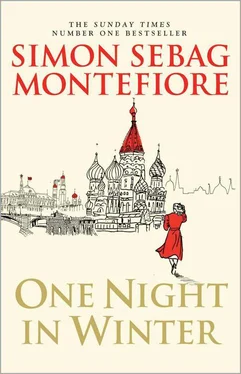Yet he felt as if some metaphysical change had taken place inside him. Could one moment like that so change a man? He shook his head. Not Hercules Satinov, surely.
THE THREE SCHOOLGIRLS sat in the Bolshoi box, buzzing with Crimean champagne and excitement because they had never had such a good view of the stage. But Rosa was a little drunk: she was so slight that the bubbles had gone straight to her head. No sooner had they sat down than she closed her eyes and put her hands to her temples. ‘Oh my God, I feel dizzy, I feel sick!’
‘She can’t be sick here!’ hissed Minka.
‘Imagine if she was sick over the edge onto the orchestra!’ replied Serafima. ‘I’ll take her home.’
‘No,’ said Minka. ‘I’ll go. I’ve shown off my dress, been admired, drunk champagne. I really don’t need to see the ballet yet again.’
‘Oddly, I’m in the mood now,’ Serafima said, waving goodbye as her two friends left.
Alone in her splendid box, she looked out on to the stage, glorying in her isolation until, well into Act Two, a young man in an American uniform joined her. He seemed surprised to find her there, and did not sit next to her but left two seats between them. He placed his cap on one of them.
Serafima looked over at him covertly. He seemed very different from his compatriots she’d met earlier, who were boorish and strapping. In contrast, he was tall and slim, and obviously cultured too for he was watching the ballet intently, his delicate lips smiling as the dancers performed their most challenging steps, sometimes just nodding thoughtfully at the music with which he seemed familiar, a finger marking the tunes.
When the interval came, he got up and left without glancing at her. She remained in her seat, wondering what to do. She was far too bashful to go to the bar on her own without Minka and Rosa’s support, but she felt a bit lonely, sitting in her box as the audience poured out to drink and smoke. So, after a minute, she ventured into the scarlet-carpeted corridor to stretch her legs, and there he was: the slim American, smoking a cigarette. Everyone else must have already bolted for the bar because they were alone.
‘A truly wonderful production,’ he said in perfect Russian. ‘Lepeshinskaya’s the best dancer in the world at the moment.’
‘Do you go to the ballet… in America?’ she asked, speaking English.
He smiled sweetly at her. ‘Your English is better than my Russian.’ He offered her a cigarette from a silver box and she took it.
‘I think Lepeshinskaya’s still developing as a dancer,’ Serafima said.
‘I don’t agree,’ he said, lighting her cigarette. ‘I think she’s already reached perfection. My question is: how long can perfection last?’
‘Does it matter when it’s timeless?’
He seemed delighted with this question and, glancing at the stairs (she guessed he was calculating how long before the crowds would be returning; seconds, she thought), he started to ask tentatively, ‘I don’t usually ask but… I was thinking… Would you think me—?’
‘No, I wouldn’t,’ she interrupted him, amazed at her own brash certainty – and suddenly blushing (how she hated this ridiculous tendency to blush); she had ruined the moment before it had even begun.
‘Will you come for a walk afterwards?’ he asked shyly and she was delighted he was not asking her for a drink, after all.
‘Yes, I’d like that,’ she said.
‘Meet me fifteen minutes after the ballet in the street behind the theatre.’ He stopped, looking uncertain; almost, Serafima thought, as though he was blushing too. ‘May I ask you your name?’
She told him.
‘Romashkin? Like the writer?’
‘My father,’ she said, expecting him to say, like everyone else, ‘Ahh, you’re the film-star’s daughter,’ but he did not say anything more and she appreciated his tact.
‘And yours?’ she asked.
‘I’m Frank Belman.’
The following afternoon, Satinov was heading out of the Front’s staff conference in the library when he bumped into Dr Dorova. They looked at each other, unsure of the right thing to do or say.
‘You’re still here?’ he said curtly. Too curtly, he thought afterwards.
‘I’m working,’ she said. ‘I’ve been out in the field with our medics since dawn and there’s a lot more to do. I’m reporting to the comrade marshal,’ and she carried on towards the conference in the library.
Smoke was billowing in the light of low green lamps when Satinov joined them later, and a crowd of officers and adjutants was leaning over the map on the billiard table.
‘Comrade Doctor Dorova,’ said Marshal Rokossovsky, ‘what do you need?’
‘A new field hospital needs to be established before the offensive,’ replied Dashka.
‘Agreed,’ said Rokossovsky.
‘I therefore need a site easily reachable from the front with the appropriate facilities, space for five hundred beds, and mattresses, and transport.’
‘Women are so much more efficient than men,’ Rokossovsky said to a chorus of male laughter.
‘And that’s not all they’re good for,’ croaked one of the generals. Satinov felt a sudden rush of irritation that he swallowed with some difficulty.
‘What more do you need, comrade doctor?’ he asked.
‘I need to look at the site. I must drive out there tonight and check it, so that we can begin setting up at dawn. It’s already getting dark.’
Rokossovsky, a cigarette between his teeth, ran one hand through his cropped grey-blond hair and peered at the map again. ‘Who can see an appropriate site?’
‘I can,’ said Satinov, stretching over. ‘Here. A shooting lodge. On the main roads. Close to the railway. Just a few kilometres behind the front.’
‘Approved!’ said Rokossovsky. ‘Thank you, Comrade Dorova. Let’s move on. Quartermaster, please report!’
Dashka came round to Satinov’s side. He had a map pin in his hand. ‘Comrade doctor,’ he said, ‘here’s your site. There! I’ll mark it for you.’ He pushed the pin into the map.
‘I see,’ she said, leaning over to put her finger on the spot so that he could smell her spicy scent and see her dimpled wrists.
FRANK BELMAN. CAPTAIN Frank Belman of the US Army. He looked too young to be a captain. As Serafima waited for him in the small street behind the Bolshoi, close to the dressing rooms, she was impressed by his discretion: he had not said a word to her in front of anyone else; he ignored her in the box after their short chat just as he had before; and she saw that, while the street had been crowded by theatregoers for ten minutes after the ballet had ended, it was now completely deserted. Unlike the boisterous Americans in the bar, he seemed to have an understanding of the Soviet system. Even though it was wartime and so many girls were keen to bag an American, Serafima knew from the comments of her parents’ friends in the leadership that already there were signs that this would not be acceptable for much longer.
She looked up, and there he was: a solitary figure, no longer in uniform, but wearing a flat cap and dark blue greatcoat, a cigarette between his lips. He was even taller than her but with his smooth pink cheeks and wide eyes he resembled a provincial poetry student. He smiled and gave a jaunty two-fingered salute as if to say: Here I am and, boy, isn’t this a blast!
Soon she was at his side. He took her arm and they walked away from the theatre, as if they had done so many times before. First they discussed the ballet rather earnestly until he said, ‘I’m being a bit of a phony. I really love the ballet but I’m no expert. I only started to attend here in Moscow. You know much more about it than me.’
Читать дальше












